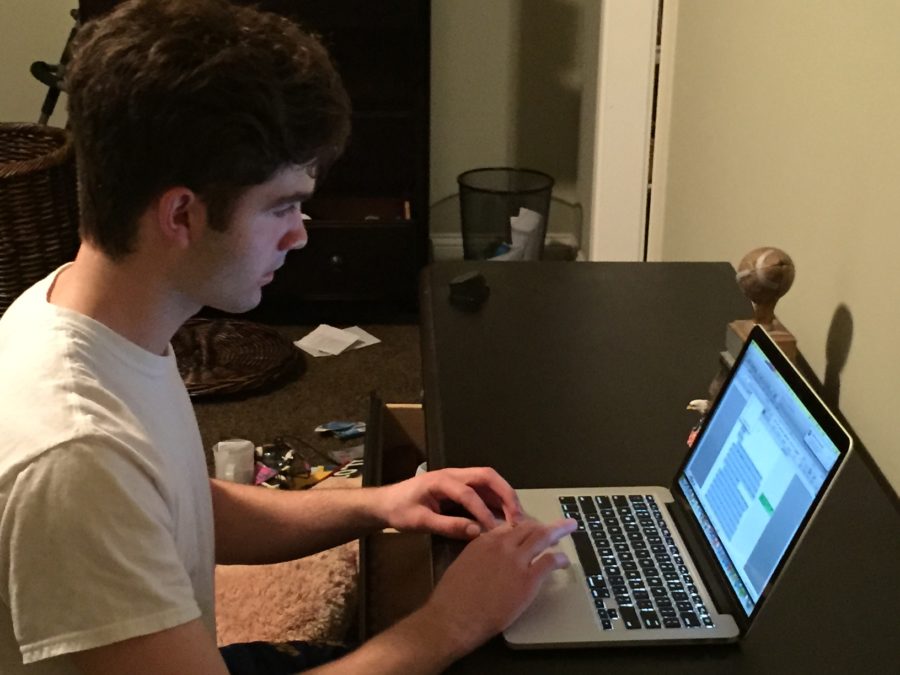
According to Superintendent Nicholas Wahl, the strategic planning results come back from the consultant at the end of April.
“(I’m) very excited about the findings there so we can start to look at strategic initiatives that hopefully will impact in a positive way how we do what we do in teaching and learning,” Wahl said.
He said he “does not have a crystal ball” but is hopeful that there is an emphasis on what to do strategically with digital learning and how to manage resources given funding challenges.
In regards to digital learning, senior Ian Finley said not all of his classes use technology, but in his IB Business class there are days where his teacher suggests students bring in their own laptop to work if they have one.
“It’s definitely more productive using your own device instead of the schools. There’s definitely advantages to bringing your own device and having that as an option but I don’t think it should be a necessity,” Finley said.
As far as funding challenges go, Wahl testified in front of the Senate on March 10 on House Bill 1001. He said he testified on behalf of Carmel Clay Schools (CCS) and public schools in general to encourage them to put money in the foundation which goes to each student in public school rather than continue to put more money into private vouchers and charters which do not go to public schools. Also, he said he spoke to encourage a more equitable distribution of funds because CCS is the lowest funded in the general fund on a per student basis in the state and he indicated that even the changes suggested in House Bill 1001, although an improvement, still would not get CCS schools out of referendum mode for 2017.
Wahl said the Senate will make their decision in late April after they get the revenue forecast. He said community members can get involved by taking a “call to action” handout that has been available atschoolboard where community members can write and encourage legislators to support the board’s legislative priorities by putting money in the foundation.
“All we can continue to hope is that (legislators) listen to us and allow us to be part of the conversation,” Wahl said.































![What happened to theater etiquette? [opinion]](https://hilite.org/wp-content/uploads/2025/04/Entertainment-Perspective-Cover-1200x471.jpg)













































![Review: “The Immortal Soul Salvage Yard:” A criminally underrated poetry collection [MUSE]](https://hilite.org/wp-content/uploads/2025/03/71cju6TvqmL._AC_UF10001000_QL80_.jpg)
![Review: "Dog Man" is Unapologetically Chaotic [MUSE]](https://hilite.org/wp-content/uploads/2025/03/dogman-1200x700.jpg)
![Review: "Ne Zha 2": The WeChat family reunion I didn’t know I needed [MUSE]](https://hilite.org/wp-content/uploads/2025/03/unnamed-4.png)
![Review in Print: Maripaz Villar brings a delightfully unique style to the world of WEBTOON [MUSE]](https://hilite.org/wp-content/uploads/2023/12/maripazcover-1200x960.jpg)
![Review: “The Sword of Kaigen” is a masterpiece [MUSE]](https://hilite.org/wp-content/uploads/2023/11/Screenshot-2023-11-26-201051.png)
![Review: Gateron Oil Kings, great linear switches, okay price [MUSE]](https://hilite.org/wp-content/uploads/2023/11/Screenshot-2023-11-26-200553.png)
![Review: “A Haunting in Venice” is a significant improvement from other Agatha Christie adaptations [MUSE]](https://hilite.org/wp-content/uploads/2023/11/e7ee2938a6d422669771bce6d8088521.jpg)
![Review: A Thanksgiving story from elementary school, still just as interesting [MUSE]](https://hilite.org/wp-content/uploads/2023/11/Screenshot-2023-11-26-195514-987x1200.png)
![Review: "When I Fly Towards You", cute, uplifting youth drama [MUSE]](https://hilite.org/wp-content/uploads/2023/09/When-I-Fly-Towards-You-Chinese-drama.png)
![Postcards from Muse: Hawaii Travel Diary [MUSE]](https://hilite.org/wp-content/uploads/2023/09/My-project-1-1200x1200.jpg)
![Review: "Ladybug & Cat Noir: The Movie," departure from original show [MUSE]](https://hilite.org/wp-content/uploads/2023/09/Ladybug__Cat_Noir_-_The_Movie_poster.jpg)
![Review in Print: "Hidden Love" is the cute, uplifting drama everyone needs [MUSE]](https://hilite.org/wp-content/uploads/2023/09/hiddenlovecover-e1693597208225-1030x1200.png)
![Review in Print: "Heartstopper" is the heartwarming queer romance we all need [MUSE]](https://hilite.org/wp-content/uploads/2023/08/museheartstoppercover-1200x654.png)



